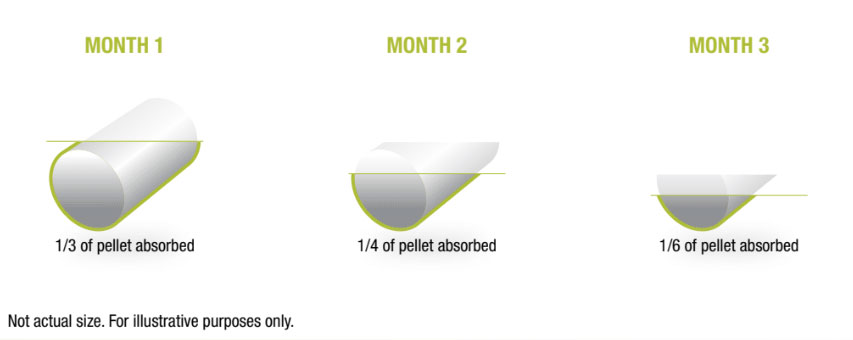Our Physicians That Offer This Treatment
What is Low T?
Low testosterone (Low T), also known as hypogonadism, occurs when a man’s body produces little or no testosterone and has associated signs and symptoms.
Low T refers to low testosterone in the blood:
- Normal testosterone levels for healthy men are approximately 300 to 1,000 nanograms per deciliter (ng/dL)
- Men with Low T generally have testosterone levels below 300 ng/dL
- Low T can be caused by certain medical conditions, such as genetic problems, chemotherapy, injury, or other hormonal problems
How common is Low T?
It has not been established exactly how many men are affected by Low T. Studies have estimated that anywhere between 1 in 20 men or up to 1 in 3 men have Low T.
Why Testopel®?
Testopel® is the only FDA-approved testosterone pellet available to help restore testosterone levels in men with Low T. Testopel helps restore testosterone levels in men with Low T for 3 to 4 months, sometimes up to 6 months. This treatment may be covered by your commercial insurance plan as well. Testopel helps to improve mood, sexual function, muscle mass and bone strength without the inconvenience and mess of testosterone gel, or the requirement of daily injections. The testosterone is administered in a quick, in-office procedure, and most men are able to resume regular activity the same day. The low-pain, low-impact procedure is so simple and effective that nine out of 10 men needing testosterone therapy report that they prefer Testopel over other treatment methods.
Testopel® is the only FDA-approved testosterone pellet available to help restore testosterone levels in men with Low T
- Testopel® helps restore testosterone levels in men with Low T for 3 to 4 months, sometimes up to 6 months
- Testopel® is covered by a majority of commercial insurance plans
Testopel® may be the right fit for men with Low T who:
- Are looking for a long-acting testosterone replacement therapy (TRT) for the treatment of their Low T
- Would like a product with dosing every 3 to 4 months
- Are interested in an in-office procedure
- Are looking for a long-acting TRT that does not transfer to others
Testopel® dosing regimen
Testopel® is inserted by a doctor during an in-office procedure. Insertion procedures can occur up to 4 times a year.

Testopel®pellets are gradually absorbed, helping to restore testosterone levels for 3-4 months, sometimes up to 6 months.

Frequently Asked Questions
Why is Testopel® considered “long-acting”?
Testopel® slowly releases testosterone into the body for 3 to 4 months, and sometimes up to 6 months.
How is Testopel® inserted?
A healthcare provider at your doctor’s office numbs the insertion site, makes a small cut in the skin, and then implants Testopel® pellets just under the skin in the hip area or another fatty area.
How big is a Testopel® pellet?
Testopel® pellet is smaller than a dime.
What are the side effects of Testopel®?
Side effects of Testopel® include more erections than normal or erections that last a long time, nausea, vomiting, changes in skin color, ankle swelling, changes in body hair, male pattern baldness, acne, suppression of certain clotting factors, bleeding in patients on blood thinners, increase or decrease in sex drive, headache, anxiety, depression, inflammation and pain at the implantation site and, rarely, anaphylactoid reaction (a sudden onset of allergic reaction).
Testopel® has been associated with infections at the implant site. In addition, there are times when the Testopel® pellets may come out of the skin. Both could occur at any time and each may require further treatment.
Serious side effects associated with abuse of testosterone and anabolic androgenic steroids include cardiac arrest, myocardial infarction, hypertrophic cardiomyopathy, congestive heart failure, cerebrovascular accident, hepatotoxicity, and serious psychiatric manifestations, including major depression, mania, paranoia, psychosis, delusions, hallucinations, hostility and aggression.
Are there people who should not receive Testopel®?
Yes. Men should not receive Testopel® or any form of testosterone replacement therapy if they have known or suspected prostate cancer or breast cancer. Also, pregnant women or women trying to get pregnant should not use Testopel® or any testosterone replacement therapy.
Will insurance pay for Testopel®?
Insurance coverage for Testopel® is not guaranteed and depends on an individual patient’s insurance plan. A doctor’s office experienced with prescribing Testopel® may be able to work with you to explore your insurance coverage. In addition, we recommend that you contact your insurance provider to verify whether Testopel® is covered
Atlantic Urology Clinics specializes in research and treatment of erectile dysfunction and premature ejaculation by offering Testopel as one treatment option. We encourage you to book an appointment today!







